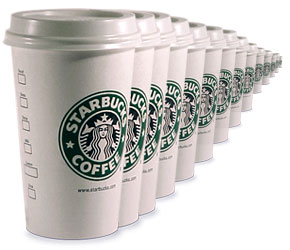Coffee giant Starbucks is in talks to open its first outlet in India by as early as the year-end to tap the growing affluence of the middle class in a nation of tea drinkers.
 "There have been ongoing plans, discussions with potential partners, the government," Colman Cuff, the Switzerland-based director of trading and operations at Starbucks, said in an interview in Bangalore Saturday.
"There have been ongoing plans, discussions with potential partners, the government," Colman Cuff, the Switzerland-based director of trading and operations at Starbucks, said in an interview in Bangalore Saturday.
"I believe we are looking at the end of the calendar year" for entering the market, said Cuff, who was in the southern Indian city to attend the three-day Indian Coffee Festival that ended Sunday.
He said he was not aware of the details.
The media has speculated for years about the Seattle-based chain entering the world's second most populous nation, which consumes 10 times as much tea as it does coffee.
In neighbouring China, another nation of tea drinkers, the chain opened its first outlet in the late 1990s and now has 190 coffee shops.
According to a company fact sheet posted on its website, as of November 2006, it ran 1,434 company-operated outlets outside the United States that serve a variety of coffees brewed from beans procured from around the world.
On his coffee buying trips to India, Cuff said he had seen the growth of local chains such as Barista and Cafe Coffee Day.
Local chains are helping spread the coffee cafe culture in the country of 1.1 billion people that exports three-quarters of the coffee it produces.
Domestic consumption last year reached 80,000 tonnes, from 60,000 tonnes the previous year, according to Tata Coffee, the country's largest producer of the commodity.
"The growth is coming mainly from coffee bars mushrooming all over the country and more young people drinking coffee," said Tata Coffee managing director Hamid Ashraff.
India's booming economy, expanding at an annual pace of nine percent, has helped push up incomes, leaving the middle classes with more money for non-essential spending, including pricey coffees.
One hurdle to Starbucks' entry may be the tariff of as much as 106 percent levied on imported coffees that is blocking Tata from bringing to India the US-based Eight O'Clock brand it bought last year.
"I don't think Starbucks will be willing to change its blends," said Ashraff.
Passing on the cost to the consumer would make coffees brewed from imported blends too expensive.
"Starbucks offers the same coffees everywhere, from Chicago to Shanghai," said Cuff. "We believe our customers should have the same experience at Starbucks anywhere in the world."
Still, the pricing would be built into any business plan that Starbucks puts together, he said.
Starbucks already procures high-quality Indian coffee varieties, Cuff said, adding it may increase purchases. The chain last year purchased 306 million pounds (138 million kilograms) of coffee worldwide, he said.